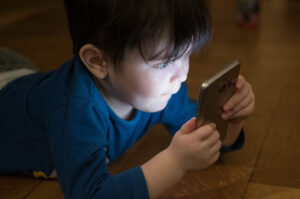Are Smartphones Rewiring Childhood?

It only takes waiting in a queue a while to see how much time everyone spends on their phones. People stand, faces tilted downwards, engrossed in their constantly communicating screens. We seem unable to take notice of what’s around us in our everyday lives. But what happens when children have access to the same technologies? The Moment takes a look at the use of smartphones in the under 16s.
It’s proving quite a dilemma. In this digital age, smartphone use permeates every aspect of our lives. From communication to entertainment, education to socialisation, these devices have become one-stop-shops for everything we need to know and for most actions we take. Smartphones have become one of the most rapidly integrated technologies: integral to our lives. But what does this mean for children?
We know that young people are on their phones more than ever and they’re starting earlier too. For Generation Z (born after 1997) and Alpha (born after 2010), smartphones and tablets are something they’ve grown up with as an integral part of their childhood entertainment. These ‘digital natives’ have never known anything different.
According to Ofcom, around 97% of children have a smartphone by the age of 12, and many are starting much younger. This upsurge in digital reliance was hastened from 2020 by the pandemic when all opportunities to socialise and learn needed, by necessity, to be carried out online. But is it something we should be avoiding or not?
The technology takeover
Let’s be honest here, using smartphones can have some real positives. As parents, grandparents, and caregivers, we all want to ensure that children harness the benefits of technology while avoiding its risks.
Smartphones can serve as powerful educational tools. With access to interactive learning platforms and huge information resources, children can grow their knowledge in various subjects. For example, want to know what a lion’s roar sounds like? Want to see a bee’s waggle dance? Perhaps your child might want to explore inside the pyramids? Just use your phone and within seconds you and your family can find out everything you need to know.
Not only that, but smartphones enable communication and connection, allowing children to stay in touch with family and friends. This is particularly useful when schedules may be hectic and distances vast. It’s just another way to connect with like- minded people.
Smartphones can foster creativity and innovation. With photography, video editing, and music composition apps at their fingertips, children can find new ways to express themselves. We know that 92% of jobs require digital skills, so allowing smartphone access may be a good way to set your child up for future success.
However, we don’t all feel at ease with this. The National Parent Survey in 2023, by Parentkind, revealed that 35% of parents felt their child spent too much time on electronic devices. It was named as one of the top three sources of anxiety for families.
There are reasons behind this. Smartphones have been adopted at great speed and they’re now one of our most popular technologies. When children started getting them, there was no research about their impact. Now there is, and we’re beginning to see potential negatives from smartphone usage emerging too.
 What is there to think about?
What is there to think about?
Smartphones can be highly addictive. Think how many times you’ve tried to concentrate on a task or a film and instead found yourself picking up your phone yet again to scroll social media or check for new notifications – despite only having done so a matter of minutes before! Smartphone use has been seen to reduce attention spans, changing the way children’s brains develop and affecting their ability to concentrate or sleep.
We also know that smartphones have the potential to expose children to harmful content before they’re emotionally equipped to deal with it. Think cyberbullying, online predators, and inappropriate content. In addition, smartphone use in teenagers has been linked to poor mental health and low self-esteem, particularly when images are filtered past the point of perfection.
The final point is that too much time spent on smartphones is time not spent with other children or exploring the great outdoors. If they’re absorbed into the world of technology, what else might they be missing out on?
On the campaign trail
Overwhelming evidence about the potential harm caused by using smartphones in childhood, made two friends – Daisy Greenwell and Clare Fernyhough – come together in spring 2024 to launch the campaign Smartphone Free Childhood.
What started as a WhatsApp group to support each other in the decision to hold off on buying their kids smartphones, was soon inundated with thousands of other parents joining, after an Instagram post about it went viral. Within hours over 60 Smartphone Free Childhood WhatsApp groups had launched across the UK.
The aim is simple: connecting parents together to agree not to give their children smartphones until at least 14, or social media before the age of 16. The campaign also wants to empower parents to begin discussions with their schools about the topic, and ultimately put pressure on government and technology companies to change regulations.
This is a national campaign, but closer to home in the Stamford and Peterborough area another group is launching their own approach. Gemma Holbird and Sarah Jane Sauntson from The Conversation (the organisation that’s on a mission to equip young people with the emotional and practical tools they need to thrive), explain: ‘While there are undoubtedly many benefits to the advances in digital technology, it is only now, as the first generation of digital natives hit young adulthood, that we are able to digest the research and fully consider the impact that the digital sphere has had on their emotional wellbeing and mental health.’
‘With the average age of phone ownership getting increasingly lower, we feel now is the time to try and turn the tide. It is important to support parents so that they are fully informed and are able to make choices that will positively support their child or young person and resist any peer, parental or societal pressure that might be detrimental.’ Gemma continues, ‘This year we are launching a campaign to encourage local primary parents to commit to delaying giving their child a smartphone until secondary school, and to help parents scaffold their child’s digital interaction. If you are a local primary parent, teacher or head who would like to link up with us, we would love to hear from you.’
Perhaps parents have been put in an impossible position? Either we give our children access to something that we’re uncertain about or we risk alienating them from their friends. So, how can parents and caregivers harness the benefits of smartphones while mitigating the risks?
 Top tips for technology use
Top tips for technology use
The first thing to think about is establishing clear boundaries regarding smartphones. This might include setting limits on screen time, having phone-free zones in the home, and encouraging regular breaks. Parents should promote open conversations about online activities and internet safety to help protect their children.
Additionally, placing value on alternative activities is crucial. Encouraging outdoor play, hobbies, reading, and other activities can provide children with enriching experiences. As part of this, leading by example is vitally important. Prioritise face-to-face family time and try to take breaks from your own phone too.
More information
- Smartphone Free Childhood: www.smartphonefreechildhood.co.uk
- The Conversation: or www.theconversationstamford.co.uk
- Internet Matters: www.internetmatters.org
- Parentkind: www.parentkind.org.uk
ADVOCATING RESPONSIBLE USE OF SMARTPHONES FOR UNDER 16S
 Dr Poppy Gibson, Senior Lecturer at ARU
Dr Poppy Gibson, Senior Lecturer at ARU
The media has been occupied with a debate around whether under 16-year-olds should have smartphones banned. Following the tragic murder of teenager Brianna Ghey, charity Parentkind is calling for political parties to create a ban on smartphones for children in their manifestos ahead of the general election.
More than four in five parents (83%) believe smartphones are ‘harmful’ to young people, a recent survey has found, with 58% of participants calling for the government to introduce an official ban on smartphones for under 16s.
As a parent of a 12-year-old son with a smartphone (and two younger children who do not yet have smartphones), I am, however, the 1 in 5. A smartphone is a powerful portal that can open up a world of danger to children, but there are benefits that smartphones can bring young people if we support them in developing good habits early on.
Parental choice
The key thread of this conversation is that parents and carers do have a choice. Most children and young people do not have the skills or funds to acquire smartphones and sustain payment of monthly tariffs without their parents. Parents can decide when or if to give their child a phone, and it is important that this decision is made for the right reasons.
What age do you think is suitable for your child to have a phone and why? Why are you giving them a phone; for safety, so you can track their movements when walking to school? For connection, so they can communicate with you? For social friendship contact? For distraction through videos, social media and gaming? Or just because all their friends have one? The decision should be made with the right reasoning behind it.
My 12-year-old son was given his phone for his birthday just before starting secondary school, where part of my decision came from him needing to walk to and from school alone. I plan on giving both of my other children smartphones around their 11th birthday before they start secondary school also.
Hobbies and interests
Smartphones offer digital opportunities for learning and creativity without the need for further expensive equipment – for example, learning a language, composing music, creating dance videos, or learning how to create digital artwork. My son downloaded a language-learning app out of his own desire to travel to Japan and he now has a 90-day streak of learning Japanese and can tell me how to order sushi and green tea!
Social connection
The vulnerability for young people comes through the social connection that smartphones offer; the 24/7 pipeline of connectivity, the pressure of posting on social media platforms and the analytics of ‘likes’ and engagement, can be overwhelming for a child trying to establish their identity in the world. Parents and carers need to have open conversations with their child about things they may encounter online, and how to react or behave when we leave timeless digital footprints online. We must prepare children for a future intertwined with technology by helping them reflect upon how social media serves them, and being able to appreciate when to delete apps or how to navigate these social spaces in a healthy way.
Learning good habits
Parents can role model healthy habits with our smartphones; don’t be scrolling your phone when you pick your children up from school or when they are talking to you. No phones when eating can promote mindful eating and mental space. Think about how to ensure your children have limits on screen time, but role model these limits too. Take breaks outside and away from screens to find shared enjoyment offline. My son actually sets his own screen time limits on various apps, which shows he is taking control of his screen time and finding a balance that works for him, which will hopefully lead to a continued positive balance with his smartphone moving forward into adulthood.
We enjoy using our phones and must accept young people will feel the same way. Through talking about how to manage our relationship with our phone in a healthy way, we can help our children better understand how to have a healthy relationship with theirs.
Twitter: @poppygibsonuk
Instagram: @drpoppygibson
aru.ac.uk/people/poppy-gibson















